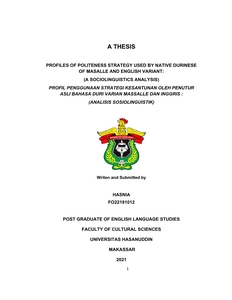Hasnia, Hasnia (2021) PROFILES OF POLITENESS STRATEGY USED BY NATIVE DURINESE OF MASALLE AND ENGLISH VARIANT: (A SOCIOLINGUISTICS ANALYSIS). Thesis thesis, Universitas Hasanuddin.
![[thumbnail of Cover]](/17415/1.hassmallThumbnailVersion/F022191012_tesis_cover1.jpg)

F022191012_tesis_cover1.jpg
Download (273kB) | Preview
F022191012_tesis_bab 1-2.pdf
Download (588kB)
F022191012_tesis_daftar pustaka.pdf
Download (165kB)
F022191012_tesis.pdf
Restricted to Repository staff only
Download (768kB)
Abstract (Abstrak)
HASNIA (F022191012). Profiles of Politeness Strategy Use by Native Durinese of Massalle and English Variant: a Sociolinguistics Analysis. (Supervised by Hamzah Machmoed and Sukmawaty)
Politeness has been regarded as a core of social interaction and it has become important part of civilization. The main purpose of this study is to address the nature of politeness strategy use Durinese speakers in Massalle area Sub-district of Masalle, Enrekang District. It also addresses whether politeness expressions considers all variables (Distance, Power, Kinship) as evidence in the previous research.
The present research has been conducted in the real setting of speakers of Durinese language by utilizing research instruments, such as direct observations, simulations, field notes, and structured questionnaires. Data were gathered based on simulated conversation in addition to direct conversation since the researcher herself is native speaker of Durinese language . Data were gathered from December 2020 to February 2021. Data obtained from structured questionnaire were recorded and classified. They were then analyzed using descriptive qualitative method. While English data source in COCA the transcrips of some conversation in English.
The analysis came up with a series of findings that partly confirm the validity of previous politeness framework, such as Brown and Levinson (1978), with reference to Kinship (K), Distance(D) and Power (P). The finding showed that the four variables account for the choice of politeness markers, such as KI, TA, IKO, KO and MU. The finding confirms that these variables have vital role in establishing social interaction among speakers of Durinese language. While the findings in English show that the politeness petterns used in England mostly use casual language, do not use cliches and honorifics.
Key Words: Politeness; interaction; kinship, Durinese, Casual, cliches, honorifics
| Item Type: | Thesis (Thesis) |
|---|---|
| Subjects: | P Language and Literature > PR English literature |
| Divisions (Program Studi): | Fakultas Ilmu Budaya > Bahasa Inggris |
| Depositing User: | S.Sos Rasman - |
| Date Deposited: | 13 Jul 2022 01:42 |
| Last Modified: | 13 Jul 2022 01:42 |
| URI: | http://repository.unhas.ac.id:443/id/eprint/17415 |


